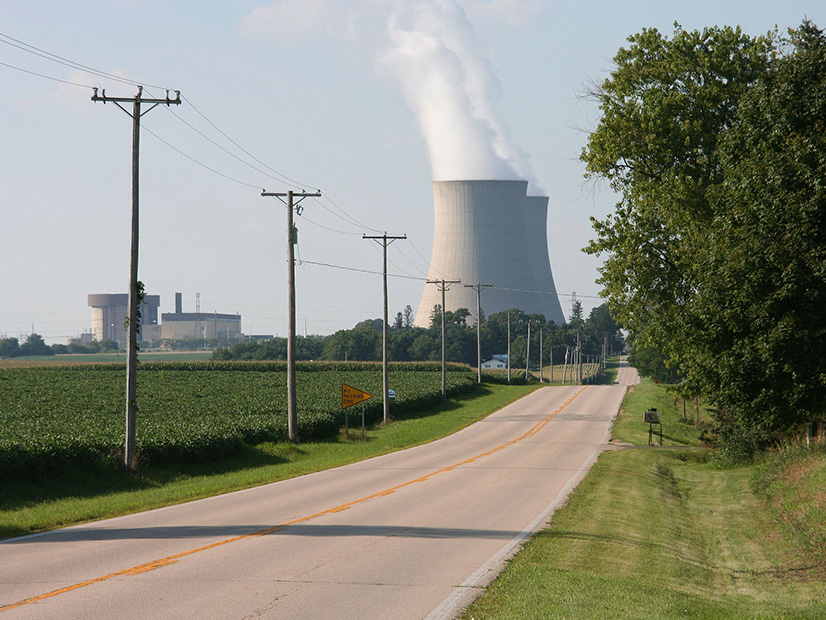
By a razor-thin margin the Illinois Senate approved landmark legislation Monday putting the state on a 30-year path to 100% carbon-free electric generation and bailing out two troubled nuclear power plants.
Nearly three years in the making, the controversial Energy Transition Act now goes to Gov. J.B. Pritzker, who said last week that he would sign the nearly 1,000-page bill if lawmakers could get it to his desk.
The Illinois House of Representatives amended and passed an earlier version of the bill on Sept. 9 in an 83-33 vote following angry opposition from Republican members, some of whom noted that the Democrats had ignored their concerns voiced during committee hearings. (See Illinois House Passes Energy Transition Act.)
The Senate approved the legislation 37-17, just one vote more than the two-thirds majority required. The vote came after a string of bitter comments from Republican members, many of them from downstate, who saw the legislation as orientated toward Greater Chicago, likely to seriously damage their communities’ economies and leading to increased electric bills statewide.
During the debate before the vote, GOP members demanded to know exactly how large the increases in monthly electric bills would be, a question that was not easily answered because state legislative analysts had not yet completed calculations. Estimates ranged from a few dollars to $18 for residential bills. Rates for commercial and industrial customers are expected to be much higher, prompting the Illinois Manufacturers Association last week to testify against the bill.
The passage might have been further delayed had Chicago-based Exelon (NASDAQ:EXC) not announced that it would shut and decommission one of its two reactors on Monday at the Byron nuclear plant without subsidies authorized in the legislation.
Exelon had shut Unit 1 of Byron overnight for scheduled refueling, but the company announced weeks ago that it would decommission rather than refuel the reactor if the state had not made a decision on a nuclear subsidy included in the bill — nearly $700 million over the next six years. Exelon announced in August that it would close both Byron and Dresden plants without a state or federal subsidy. Each plant has two reactors. (See Exelon CEO: Looming Nuclear Plant Closures will be ‘Irreversible’.)
The bill sets shutdown targets for all coal and gas power plants in the state over the coming decades, making the nuclear plants key players in a carbon-free future. Exelon operates six nuclear plants in Illinois, five of which include two reactors.
The legislation requires all investor-owned baseload coal-fired power plants and remaining oil peaker turbines to shut down by 2030. The municipally owned Prairie State coal plant, with customers in six states, must reduce its emissions by 45% by 2035 through carbon capture and sequestration and must shut down by 2045, unless it can curtail all of its carbon dioxide emissions. City Water, Light and Power, the Springfield municipal power operation, which heats and lights the State House, will face the same shutdown rule.
Gas turbine plants, even those now under construction, must also close by 2045 under the terms of the bill, although the state would have an option to allow continued operation if they are critically needed: in other words, if the anticipated growth in renewable energy — from 7% currently to 100% by 2045 — cannot be achieved.
The bill also allocates hundred of millions of dollars to expand solar installations, both on a community solar level and homeowner rooftop solar. Electric vehicle purchase rebates of $4,000 are also in the legislation, but only in certain counties where local governments will collect to finance the rebates.
Pritzker, labor supporting the continued operation of the nuclear plants, environmental groups such as the Sierra Club and the National Resources Defense Council, and a number of renewable energy trade groups coalesced over the past year to push for the bill.
In a statement issued Monday afternoon, Pritzker said the passage is “historic.”
“Today, with the Senate passage of SB 2408, the state of Illinois is making history by setting aggressive standards for a 100% clean energy future. After years of debate and discussion, science has prevailed, and we are charting a new future that works to mitigate the impacts of climate change here in Illinois.”
A statement from the Path to 100 Coalition of renewable energy advocates said the passage of the bill “puts Illinois at the forefront of the fight against climate change all while creating tens of thousands of jobs, expanding diversity in the renewable energy industry and providing more than $1 billion in electricity bill savings for consumers.”
“Opening the Illinois market is critical to the growth of energy sources that will clean the air, create jobs and jumpstart the state’s economy,” asserted Abigail Ross Hopper, CEO of the Solar Energy Industries Association. “Illinois is now a national leader in crafting renewable energy solutions.”
Advanced Energy Economy called the bill “the most significant climate and clean energy legislation” in the history of the state.


